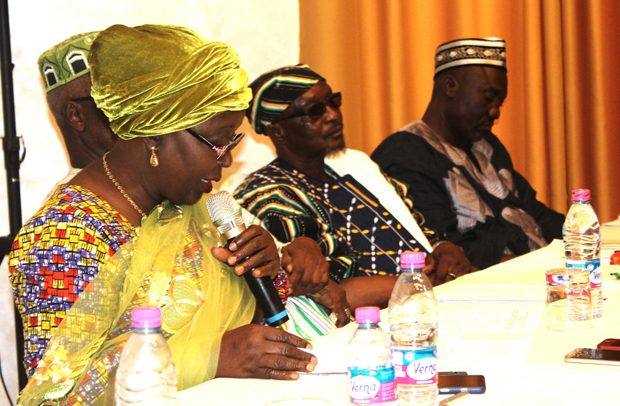Hajia Alima Mahama (left) Bonaba – Naba Salifu Alemyarum(mid) Regional Co-ordinating Director(right)
Minister of Local Government and Rural Development, Hajia Alima Mahama, has called on local assemblies, traditional authorities and other development stakeholders across the country to help in sensitizing the public to show interest and participate fully in the process for electing metropolitan, municipal and district chief executives (MMDCEs) by 2021.
According to her, after 30 years of practising decentralized and local governance in Ghana, the country and Ghanaians at their various local levels should be ready by now to accept and support the election of MMDCEs in order to have their hands in the selection of our local chief executives.
In her view, electing MMDCEs is one sure way to give power to people at the local level and also a way to reduce the increasing rate of partisan polarization among the citizenry.
“If we vote for MMDCEs, power is very likely to be spread among people of different political backgrounds and yet will have to work together for the purpose of developing the various districts and regions across the country.” Hajia Alima Mahama noted.
The minister was speaking in Bolgatanga in the Upper East Region at the 10th Regional Consultation and Sensitization workshop on the election of MMDCEs.
Hajia Alima Mahama noted that the calls for a change in the mode of appointing MMDCEs have been high among a list of governance gaps in Ghana’s local governance system for sometime; hence government is commitment to ensuring that MMDCEs are elected by the local people.
“Since the introduction of the 1992 Constitution, there have been incessant calls for a change in the manner of appointing MMDCEs, which in the opinion of many Ghanaians, is undemocratic. It was argued that it is undemocratic to superimpose a national government structure over a local government… to address this democratic deficit. The New Patriotic Party in its 2016 manifesto promised to get MMDCEs elected if the party was elected into office. …the process is ongoing and government is committed to it,” Hajia Alima Mahama assured them.
The Local Government Ministry has had consultations in all regions of the country as a way of sensitizing and seeking the views of key stakeholders on the functions, roles and responsibilities of MMDCEs that warrant their election to the position on partisan basis instead of the current mode of appointing for assembly members to confirm.
It was also to prepare the stakeholders to join in the constitutional and legal changes that would be required to get MMDCEs elected and not appointed.
Finally, the nationwide consultation is meant to build consensus among a wide range of stakeholders on how to deepen local democracy and good governance with the election of MMDCEs on partisan basis.
Participants who made group presentations were divided over whether or not to elect the MMDCEs on partisan basis.
For those who opposed the partisan election of MMDCEs, they suggested that the election should just be for individuals who are interested in leading their districts and the winner declared based on simple majority.
Those who supported the partisan election of the MMDCEs said the partisan basis would encourage more participation and also erode the situation where power from the Presidency to the MMDCEs is controlled by one party, which has resulted in the “winner takes all” system of governance in Ghana.
There were suggestions that all elections in Ghana – from the presidential to the district assembly elections and the proposed election of the MMDCEs be done in one day to save resources and time.
In the view of the participants who made this suggestion, if all elections are held in one day, no group of politicians will influence the election of another. For example, if presidential and parliamentary elections are done before the election of MMDCEs and assembly members, people can use their powers to influence the outcome of the MMDCEs and assembly elections.
The workshop was attended by traditional leaders, municipal and district chief executives, civil society organizations, co-ordinating directors, media and other groups from all over the Upper East Region.
FROM: EBO BRUCE-QUANSAH, Bolgatanga


